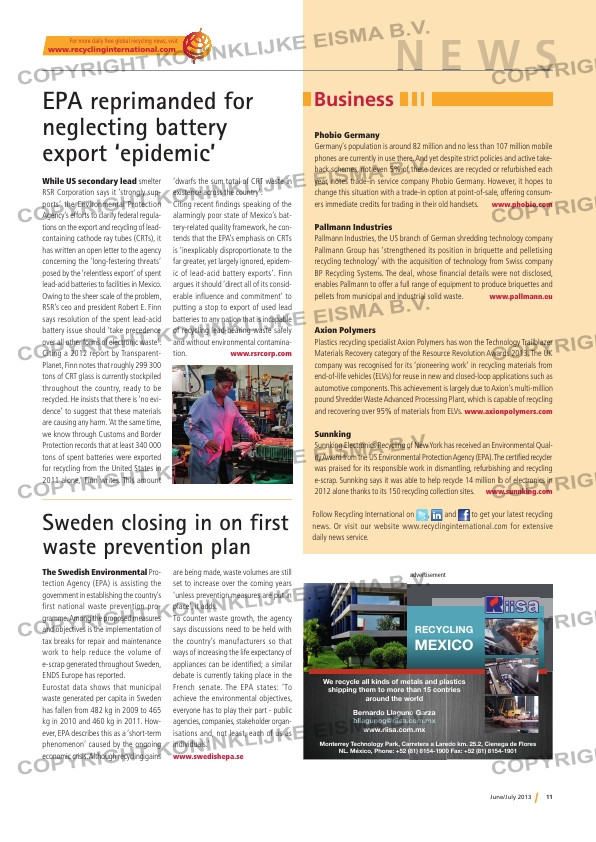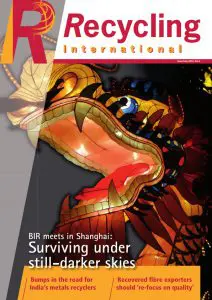Page 11 from: June / July 2013

N E W S
11June/July 2013
For more daily free global recycling news, visit
www.recyclinginternational.com
Phobio Germany
Germany’s population is around 82 million and no less than 107 million mobile
phones are currently in use there. And yet despite strict policies and active take-
back schemes, not even 5% of these devices are recycled or refurbished each
year, notes trade-in service company Phobio Germany. However, it hopes to
change this situation with a trade-in option at point-of-sale, offering consum-
ers immediate credits for trading in their old handsets. www.phobio.com
Pallmann Industries
Pallmann Industries, the US branch of German shredding technology company
Pallmann Group has ‘strengthened its position in briquette and pelletising
recycling technology’ with the acquisition of technology from Swiss company
BP Recycling Systems. The deal, whose fi nancial details were not disclosed,
enables Pallmann to offer a full range of equipment to produce briquettes and
pellets from municipal and industrial solid waste. www.pallmann.eu
Axion Polymers
Plastics recycling specialist Axion Polymers has won the Technology Trailblazer
Materials Recovery category of the Resource Revolution Awards 2013. The UK
company was recognised for its ‘pioneering work’ in recycling materials from
end-of-life vehicles (ELVs) for reuse in new and closed-loop applications such as
automotive components. This achievement is largely due to Axion’s multi-million
pound Shredder Waste Advanced Processing Plant, which is capable of recycling
and recovering over 95% of materials from ELVs. www.axionpolymers.com
Sunnking
Sunnking Electronics Recycling of New York has received an Environmental Qual-
ity Award from the US Environmental Protection Agency (EPA). The certifi ed recycler
was praised for its responsible work in dismantling, refurbishing and recycling
e-scrap. Sunnking says it was able to help recycle 14 million lb of electronics in
2012 alone thanks to its 150 recycling collection sites. www.sunnking.com
We recycle all kinds of metals and plastics
shipping them to more than 15 contries
around the world
Bernardo Llaguno Garza
[email protected]
www.riisa.com.mx
Monterrey Technology Park, Carretera a Laredo km. 25.2, Cienega de Flores
NL. México, Phone: +52 (81) 8154-1900 Fax: +52 (81) 8154-1901
RECYCLING
MEXICO
advertisement
Business
Follow Recycling International on , and to get your latest recycling
news. Or visit our website www.recyclinginternational.com for extensive
daily news service.
While US secondary lead smelter
RSR Corporation says it ‘strongly sup-
ports’ the Environmental Protection
Agency’s efforts to clarify federal regula-
tions on the export and recycling of lead-
containing cathode ray tubes (CRTs), it
has written an open letter to the agency
concerning the ‘long-festering threats’
posed by the ‘relentless export’ of spent
lead-acid batteries to facilities in Mexico.
Owing to the sheer scale of the problem,
RSR’s ceo and president Robert E. Finn
says resolution of the spent lead-acid
battery issue should ‘take precedence
over all other forms of electronic waste’.
Citing a 2012 report by Transparent-
Planet, Finn notes that roughly 299 300
tons of CRT glass is currently stockpiled
throughout the country, ready to be
recycled. He insists that there is ‘no evi-
dence’ to suggest that these materials
are causing any harm. ‘At the same time,
we know through Customs and Border
Protection records that at least 340 000
tons of spent batteries were exported
for recycling from the United States in
2011 alone,’ Finn writes. This amount
‘dwarfs the sum total of CRT waste in
existence across the country’.
Citing recent fi ndings speaking of the
alarmingly poor state of Mexico’s bat-
tery-related quality framework, he con-
tends that the EPA’s emphasis on CRTs
is ‘inexplicably disproportionate to the
far greater, yet largely ignored, epidem-
ic of lead-acid battery exports’. Finn
argues it should ‘direct all of its consid-
erable infl uence and commitment’ to
putting a stop to export of used lead
batteries to any nation that is incapable
of recycling lead-bearing waste safely
and without environmental contamina-
tion. www.rsrcorp.com
EPA reprimanded for
neglecting battery
export ‘epidemic’
The Swedish Environmental Pro-
tection Agency (EPA) is assisting the
government in establishing the country’s
first national waste prevention pro-
gramme. Among the proposed measures
and objectives is the implementation of
tax breaks for repair and maintenance
work to help reduce the volume of
e-scrap generated throughout Sweden,
ENDS Europe has reported.
Eurostat data shows that municipal
waste generated per capita in Sweden
has fallen from 482 kg in 2009 to 465
kg in 2010 and 460 kg in 2011. How-
ever, EPA describes this as a ‘short-term
phenomenon’ caused by the ongoing
economic crisis. Although recycling gains
are being made, waste volumes are still
set to increase over the coming years
‘unless prevention measures are put in
place’, it adds.
To counter waste growth, the agency
says discussions need to be held with
the country’s manufacturers so that
ways of increasing the life expectancy of
appliances can be identifi ed; a similar
debate is currently taking place in the
French senate. The EPA states: ‘To
achieve the environmental objectives,
everyone has to play their part – public
agencies, companies, stakeholder organ-
isations and, not least, each of us as
individuals.’
www.swedishepa.se
Sweden closing in on first
waste prevention plan
RI-5_NEWS.indd 11 17-06-13 15:31



